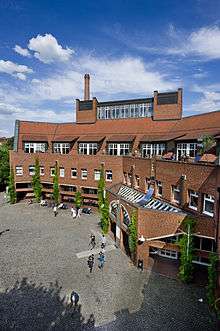University of Kassel
|
| |
| Type | Public university |
|---|---|
| Established | 1971 |
| President | Rolf-Dieter Postlep[1] |
Administrative staff | ca. 2,120 |
| Students | 24,385 (as of September 2016) |
| Location | Kassel, Germany |
| Website |
www |
| Date from website 2009 | |
The University of Kassel (German: Universität Kassel) is a university founded in 1971 located in Kassel, Hesse, in Germany.[2] As of October 2013 it had about 23,000 students and more than 2,600 staff, including 307 professors.[3]
International summer universities, intensive German language courses and orientation programmes for international students and students come from over 115 countries.
Each academic year, more than 100 visiting scholars pursue research projects in cooperation with colleagues from the University of Kassel, making a valuable contribution to the academic and cultural life. The newly established International House is located on the campus. It offers hostels for international guests and is available for meetings, conferences, and cultural events.
Schools
A wide range of undergraduate and postgraduate study programmes is offered in the following fields of study. All study programmes are open to German and international students alike. A range of degrees can be obtained, including the traditional German Diplom degrees, bachelor's and master's degrees, the Artistic Examination, or a Doctorate:
- Natural Sciences
- Engineering Sciences
- Architecture, Urban Planning and Landscape Planning
- International Agriculture and Environmental Protection
- Social Sciences
- Humanities
- Fine Arts
Two Academy Awards (or Oscar) in the area of animation films, plus three nominations, have so far been won by graduates from the Kassel School of Arts.
Interdisciplinary research
Interdisciplinary research is a priority for the University of Kassel. This includes research cooperation and dialogue with international research institutions, such as the Fraunhofer Society. The interdisciplinary research centres and institutes include:
- Centre for Career and Higher Education Research
- Centre for Environmental Systems Research
- Centre for Interdisciplinary Nanostructure Science and Technology (CINSAT)
- International Center for Development and Decent Work (ICDD)
- Institute for Wind Energy and Energy System Technology – (IWES)
- Institute for Solar Energy Supply Engineering (ISET)
Scientists at the Centre for Environmental Systems Research at the University of Kassel have been investigating how Germany can power itself entirely by renewable energy.[4]
Library

The library of the University of Kassel serves as a Library of the State of Hesse (an important function in the German system of libraries). It was formed by merging the Landesbibliothek (founded 1580 be Landgraf Wilhelm IV of Hesse) and the Murhardsche Bibliothek (founded 1845 by the testament of scholar Friedrich Wilhelm August Murhard and his brother Friedrich Wilhelm August Murhard and opened 1905 as a city library).
A special focus of the library is the collection of early medieval manuscripts (over 10,000 in the collection) and early prints (mainly from the personal library of the Landgrafen, who devoted themselves to natural history, natural philosophy, astronomy, astrology, and alchemy). A few of the most important items have been digitized.[5]
The two most impressive items of the collection are the Hildebrandslied (from c. 830) and the proof copy of the Children's and Household Tales, the famous fairy tales of the Brothers Grimm (the Kinder - und Hausmärchen der Gebrüder Grimm) (1812/1815), an annotated copy that was chosen as part of the UNESCO Memory of the World in 2005.[6]
The library holds an early medieval text preserved in a manuscript from c. 810 known as the Kassel conversations (in German: Kasseler Gespräche).
Notable people
Scholars
- Volker Braun – Grimm Professor
- Heinz Bude – Professor of Sociology
- Kristian Köchy – Professor of Bioethics
- Ulrich Kutschera – Professor of Evolutionary Biology
- Jan Marco Leimeister – Professor of Business informatics
- Winfried Nöth – Professor of Semiotics
- Rudolf Schmitt – 19th century scholar
- Helmuth Schneider – Professor of Ancient History
- Alexander Roßnagel – Professor of law with focus on privacy protection and digital economy
- Lutz Michael Wegner – Professor of Computer Science
Alumni
- Günther Cramer – Entrepreneur, SMA Technologie
- Thomas Stellmach (b. 1965) – Filmmaker and winner of the Academy Award for the animated motion picture Quest
- Klaus Stern (b. 1968) – Filmmaker and winner of the Adolf-Grimme-Preis for Weltmarktführer (2004), a documentary
- Horst Wackerbarth (b. 1950) – Photographer
- Barbara Westermann – Sculptor[7]
- Ines Mergel - Expert in Social Media at The Maxwell School of Citizenship and Public Affairs at Syracuse University
See also
- Kassel conversations
- List of early modern universities in Europe
- Red Brick Company – English language drama group
- International Summer University (ISU) Kassel
- International Winter University (IWU) Kassel
References
- ↑ "Executive Board". Retrieved August 13, 2013.
- ↑ "Universität Kassel: Über uns". Uni-kassel.de. Retrieved 2014-04-23.
- ↑ "Universität Kassel: Zahlen und Fakten". Uni-kassel.de. Retrieved 2014-04-23.
- ↑ Rabid
- ↑ "Digitalisate". Universitätsbibliothek Kassel.
- ↑ "The Fairy Tales of the Brothers Grimm Accepted into UNESCO's Memory of the World Registry". Marvels & Tales. 19 (2): 350–354. 2005. doi:10.1353/mat.2005.0038.
- ↑ Alumni & Career Service of the University of Kassel
External links
 Media related to University of Kassel at Wikimedia Commons
Media related to University of Kassel at Wikimedia Commons
Coordinates: 51°19′22″N 9°30′27″E / 51.322774°N 9.507562°E